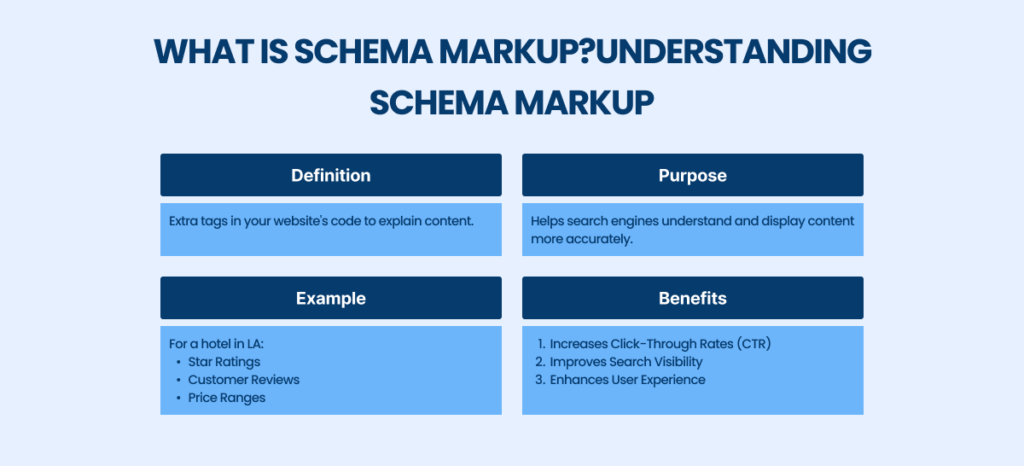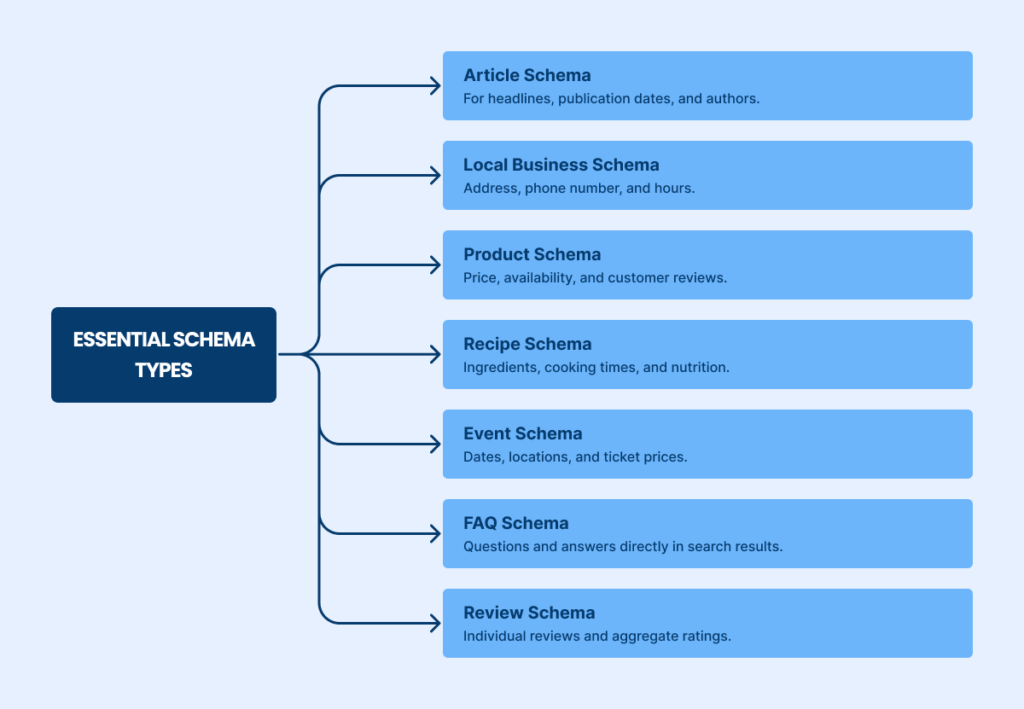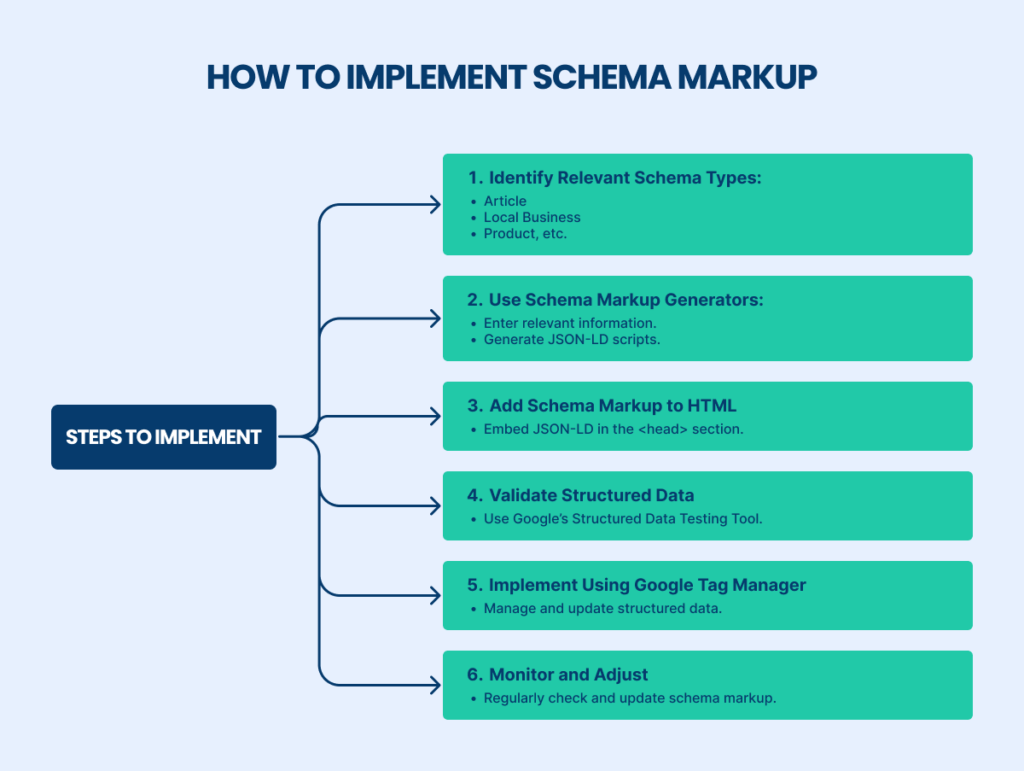Have you ever considered how to make your business’s website truly stand out in the crowded digital landscape?
Imagine potential customers searching for “hotels in LA,” and your listing instantly grabs their attention with star ratings, reviews, and price ranges in the search results. This enhanced visibility isn’t just luck—it’s the power of schema markup SEO at work!
This tool can make your online presence more noticeable and make your business more appealing to prospective customers.
At [A] Growth Agency, we focus on implementing advanced search engine optimization strategies, like schema markup, to boost your online visibility and draw more targeted traffic to your site.
Our SEO agency is dedicated to helping businesses enhance their digital presence through effective and tailored SEO solutions.
Schema markup SEO involves adding structured data to your HTML, making search engines interpret your content more efficiently. This can cause rich snippets in search results, offering visually appealing and informative displays.
By utilizing schema markup for SEO, businesses can improve their click-through rates (CTR) and attract more potential customers.
Understanding and implementing schema markup for SEO can be a game-changer for your business. This improves user experience and establishes your website as a trusted source of information.
Partnering with [A] Growth Agency ensures you’re not alone in harnessing the full potential of schema markup, giving you the confidence to elevate your SEO strategy to new heights.
What is Schema Markup?
Schema markup is like adding extra tags to your website’s code explaining each piece of content. This helps search engines understand your content more accurately and deliver more relevant search results.
For example, if you’re running a hotel in LA, adding schema markup can directly showcase your star ratings, customer reviews, and price ranges in the search results.
This makes your listing more attractive and informative, increasing the likelihood of clicks.
According to a case study by Search Engine Land, websites that implemented schema markup saw a 30% increase in click-through rates (CTR).

Incorporating Schema Markup into Your SEO Strategy
Incorporating schema markup SEO is a critical component of advanced SEO strategies. It’s part of a broader approach that includes programmatic SEO, leveraging AI in SEO, and staying ahead of future SEO trends.
A study shows that two-thirds (65%) of marketers who use AI-generated content saw an improvement in their SEO results.
Schema markup works seamlessly with SGE (Search Generative Experience) and aligns with Google’s E-E-A-T (Expertise, Authoritativeness, Trustworthiness) guidelines, ensuring your content is high-quality and credible.
A technical SEO audit is essential to implementing schema markup for SEO. This audit will identify areas where structured data can be applied for maximum impact.
Additionally, website speed optimization, SEO mobile optimization, and international SEO considerations are crucial in how effectively search engines interpret your schema markup.
SEO automation tools can smooth out the process of adding and maintaining schema markup, while natural language processing SEO techniques can increase the relevance and accuracy of the data provided.
As SEO continues to evolve, staying updated with these advanced techniques is not just a necessity but a source of pride.
It ensures your website remains competitive in the digital landscape, a testament to your dedication and adaptability.
Benefits of Schema Markup
Implementing schema markup SEO offers numerous benefits that can significantly enhance your website’s search results performance.
By using structured data, you provide search engines with in-depth information about your web pages, making it easier for them to understand and index your content effectively.
- Enhanced Search Results: Schema markup helps create rich snippets that stand out in search results. These snippets can include images, star ratings, reviews, and more, making your listings more attractive to users. According to a case study by Search Engine Land, websites that used schema markup saw a 30% increase in click-through rates (CTR).
- Improved Click-Through Rates (CTR): By providing search engines with structured data, you can directly present more relevant and appealing information in the search results. This increases the possibility of users clicking on your link, driving more qualified traffic to your website.
- Better Local SEO: For local businesses, schema markup can display essential details like location, hours of operation, and contact information in the search results. This helps potential customers find your business page more efficiently.
- Voice Search Optimization: Schema markup for SEO enhances the way voice search devices interpret your content. This can increase the chances of your website being featured in voice search results, making it easier for users to find your business through voice queries.
- Increased Visibility in SERPs: Using schema markup SEO can boost your website’s visibility in search engine results pages (SERPs). This means your content is more likely to appear in featured snippets, knowledge graphs, and other prominent areas of the search results.
To implement schema markup effectively, you can use tools like a schema markup generator to create the necessary code snippets.
Additionally, the structured data testing tool from Google can help you ensure your markup is correctly implemented and functioning as expected.
By leveraging schema markup SEO, you not only enhance the demonstration of your content in search results but also provide search engines with the detailed information they need to rank your pages more accurately.
This results in higher visibility, increased traffic, and, ultimately, better performance for your website.
Types of Schema Markup
If you want to make your website content more appealing to the audience and search engines, schema markup SEO offers a powerful solution.
Let’s explore some practical examples of various types of schema markup, such as Event Schema, FAQ Schema, and Video Schema, and how they can significantly enhance your online presence.
Article Schema
Article schema markup helps Google understand the critical details of your articles, such as the headline, date published, and author.
This leads to better visibility in search results, especially for timely news stories. By writing schema markup for your articles, you can ensure they stand out in the crowded digital space.
Local Business Schema
Do you own a local business? By adding schema markup for your business, you can directly display important information like your address, phone number, and business hours in search results.
Imagine someone searching for “best pizza in NYC” and immediately finding your restaurant with all the necessary details! This type of schema markup SEO is particularly beneficial for attracting local customers.
Product Schema
Are you selling products online? In search results, product schema markup can show price, availability, and customer reviews. This makes your listings more attractive and informative, increasing the chances of a click.
For instance, searching for “running shoes” could reveal your product with a five-star rating and a discounted price. Adding this valuable information can be simplified by using schema markup generators.
Recipe Schema
If you run a food blog, recipe schema markup can highlight ingredients, cooking times, and nutritional information. This makes your recipes stand out in search results and attracts more food enthusiasts to your site.
Imagine your chocolate cake recipe showing up with all the delicious details right there! Schema markup for SEO is crucial in making your recipes more discoverable.
Event Schema
Are you hosting events? In search results, event schema markup can display event dates, locations, and ticket prices. This is perfect for concerts, webinars, or local gatherings.
Consider users searching for “concerts in LA” and seeing your event details prominently displayed. By incorporating schema markup SEO, you can boost event attendance and awareness.
FAQ Schema
Do you have an FAQ section on your site? FAQ schema markup allows your questions and answers to appear directly in search results, providing quick answers to users’ queries.
This enhances user experience and positions your site as a reliable source of information. It aligns well with advanced SEO strategies and can be a game-changer for visibility.
Review Schema
Collecting reviews from customers? Review schema markup can display individual reviews and aggregate ratings in search results.
This builds trust and connection with potential customers and can significantly improve your click-through rates. It’s a great way to leverage user-generated content for SEO.
By leveraging schema markup SEO, you enhance the presentation of your content in search results and provide search engines with the detailed information they need to rank your pages more accurately.
This results in higher visibility, increased traffic, and, ultimately, better performance for your website.

Best Practices for Schema Markup SEO
Implementing schema markup SEO effectively requires following certain best practices to ensure your structured data is accurate, efficient, and beneficial for your search engine visibility.
Here are some tips to help you make the most of schema markup:
Use JSON-LD Format
Google recommends using JSON-LD (JavaScript Object Notation for Linked Data) to add structured data to your HTML. JSON-LD scripts are easy to create and integrate without altering your HTML tag attributes. They also help keep your code clean and organized.
Keep Your Data Accurate and Up-to-Date
Review and update your schema markup regularly to ensure it reflects the current state of your content. Outdated or incorrectly structured data can mislead users and search engines, negatively impacting your SEO efforts.
Avoid Overloading Your Pages
While providing detailed structured data is beneficial, avoid overloading your pages with excessive schema markup. Focus on the most relevant types and properties that enhance the understanding of your content. Overuse can lead to confusion and potential penalties from search engines.
Stay Compliant with Google’s Guidelines
Ensure your schema markup complies with Google’s guidelines, including those for E-E-A-T (Expertise, Authoritativeness, Trustworthiness).
This includes providing accurate, trustworthy information and avoiding manipulative practices like keyword stuffing or fake reviews.
Adhering to these best practices can maximize the benefits of schema markup SEO, enhancing your website’s visibility and performance in search results.
When implemented correctly, structured data markup is a powerful tool to set your site apart in a crowded digital landscape.
Identify Relevant Schema Types
First, identify the schema types that are most relevant to your content. Whether it’s an Article, Local Business, Product, Recipe, Event, FAQ, or Review schema, choosing the appropriate type ensures that your structured data accurately represents your content in Google search results.
Use Schema Markup Generators
Tools like schema markup generators can simplify the creation of the necessary code snippets. These tools give you the opportunity to enter the relevant information, and they generate the JSON-LD script or other structured data formats for you.
Add Schema Markup to Your HTML
Once you have your structured data, add it to your HTML. For example, you can embed a JSON-LD script within your HTML document’s <head> section. Here’s a basic example of how to implement a Product schema using JSON-LD:
Validate Your Structured Data
After adding the structured data, it’s crucial to validate it to ensure no errors. Use Google’s Structured Data Testing Tool to review your code snippets. This tool highlights any issues and provides suggestions for fixes.
Implement Using Google Tag Manager
You can implement schema markup using Google Tag Manager for a more dynamic approach. This method is beneficial if you want to manage and update your structured data markup without directly editing your site’s HTML.
Google Tag Manager allows you to add JSON-LD scripts and other schema types using custom HTML tags.
Monitor and Adjust
Finally, regularly monitor your structured data to ensure it performs well. As you update your site or add new content, revisit your schema markup to keep it accurate and relevant.
Keeping an eye on future SEO trends and updates from Google will help you maintain an optimized site.
Following these steps, you can implement schema markup on your website successfully, improving your visibility and performance in Google search results.

Advanced Techniques in Schema Markup
Schema markup is a dynamic area within SEO, continually evolving with new types and attributes that can be utilized to enhance content visibility.
Leveraging advanced schema types, such as Speakable Schema for voice search optimization and Breadcrumb Schema for better navigation, can provide substantial benefits.
Speakable Schema, for example, can be used to mark specific text sections as suitable for text-to-speech conversion, enhancing content accessibility and aligning with the growing trend of voice search.
Furthermore, implementing structured data with JSON-LD (JavaScript Object Notation for Linked Data) simplifies the inclusion of structured data and future-proofs your website, as major search engines prefer this format.
Keeping up with the latest schema types and properties and incorporating them into your SEO strategy ensures that your site remains competitive and capable of appearing in rich search results, enhancing user experience and engagement.
Emerging Trends in Structured Data
The landscape of structured data is rapidly advancing, with new trends shaping how businesses can optimize their content.
One emerging trend is the use of schema markup to enhance content for Artificial Intelligence (AI) and Machine Learning (ML) applications.
This includes providing more detailed metadata for images and videos and improving the accuracy of AI algorithms in understanding and categorizing visual content.
Another significant trend is integrating structured data with rich media formats, such as augmented reality (AR) and virtual reality (VR).
As these technologies become more mainstream, using schema markup to describe AR and VR experiences can enhance discoverability and engagement.
There is growing interest in using schema markup for detailed user experience (UX) insights, such as tracking interactive elements like forms and calls to action, which can provide deeper analytics and improve conversion optimization strategies.
By being one step ahead of these trends and constantly refining your schema markup strategy, your business can improve its search engine appearance and provide richer, more engaging user experiences.
At [A] Growth Agency, we stay at the forefront of these advancements, ensuring our clients benefit from cutting-edge SEO techniques.
Boost Your SEO With Azarian Growth Agency
Implementing schema markup SEO is a powerful strategy to enhance your website’s visibility and performance in search results.
Using structured data markup, you can provide search engines with detailed information and insights about your content, resulting in rich snippets that attract more clicks and drive traffic to your site.
At [A] Growth Agency, we specialize in advanced search engine optimization techniques, including schema markup, programmatic SEO, AI in SEO, and more.
Our growth team is dedicated to helping your business stay ahead of the competition by leveraging the latest SEO trends and technologies.
Ready to elevate your SEO game?
Let [A] Growth Agency guide you through the complexities of schema markup and other advanced SEO strategies – partner with us to maximize your online presence and achieve exponential growth.

